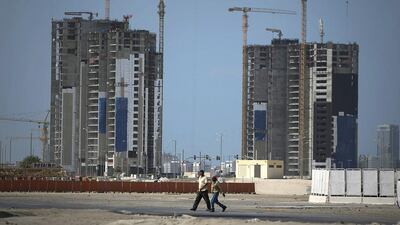Inflation in Abu Dhabi remained at a six-year high for the second consecutive month in April, as pressure on housing costs showed no sign of easing, data from Reuters and the Statistics Center Abu Dhabi showed.
Prices rose at 5.3 per cent year-on-year, the same rate as the previous month, in the latest sign that a rising population is placing pressure on housing, health care and education.
Low oil prices and a strong dollar have pushed down import prices from abroad and lowered forecasts for growth in the UAE. But Abu Dhabi’s population is growing faster than the city can add new infrastructure, putting upwards pressure on prices.
Abu Dhabi rents rose by 12 per cent last year and a further 2 per cent in the first three months of the year, the property broker CBRE said.
The slowest rate of housing project completion for six years is likely to stoke further inflation in houses, as population gains outstrip the availability of housing.
In total 35,000 new houses are set to be added to the capital over the next four years, analysts at CBRE said, but only 750 were handed over in the first three months of the year.
Reductions in subsidies on fuel and energy prices have also put pressure on Abu Dhabi resident budgets, with expats paying more for gas and electricity from the Abu Dhabi Distribution Company since January 1.
Falling food costs have partially offset price rises elsewhere, as low global agricultural commodities prices and a strong currency have led to falling prices of imported consumer goods.
Living standards are continuing to rise – but the gap between price increases and salary gains is narrowing.
Across the UAE, wages grew at just over 6 per cent last year, according to data from the recruitment agency Gulf Talent.
Inflation in Abu Dhabi rose by a smaller amount, meaning that take-home pay rose for most residents.
But after the IMF downgraded growth prospects for the UAE’s non-oil sector in its most recent regional economic outlook, wage growth is likely to slow down even as prices continue to rise.
Chris Greaves, managing director of the recruitment agency Hays, expects wages to grow by 3 to 5 per cent this year – falling short of typical employee expectations of double-digit pay increases.
abouyamourn@thenational.ae
Follow The National's Business section on Twitter

